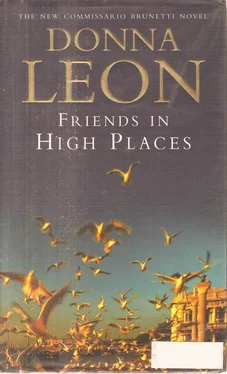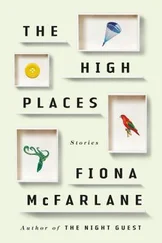Those shabby people: he summoned them from memory and recalled the worn handle on her plastic handbag, the stitching on her husband’s left shoe that showed how often it had been repaired. Was this camouflage to protect them from the jealous eyes of the city or was it a form of avarice run mad? And where, in all of this, was he meant to fit the battered body of Franco Rossi, found fatally injured in front of a building owned by the Volpatos?
Brunetti spent the next hour contemplating greed, a vice for which Venetians had always had a natural propensity. La Serenissima was, from the beginning, a commercial enterprise, so the acquisition of wealth had ever been among the highest goals toward which a Venetian was trained to aspire. Unlike those profligate southerners, Romans and Florentines, who made money in order to toss it away, who delighted in hurling golden cups and plates into their rivers in order to make public display of their wealth, the Venetians had early on learned to acquire and maintain, to keep, to amass, and to hoard; they had also learned to keep their wealth hidden. Surely, the grand palazzi that lined the Canal Grande did not speak of hidden wealth; quite the contrary. But these were the Mocenigos, the Barbaros, families so lavishly blessed by the gods of lucre that any attempt to disguise their wealth would have been in vain. Their fame protected them from the disease of greed.
Its symptoms were far more manifest in the minor families, the fat merchants who built their more modest palazzi on the back canals, built them over their warehouses so that they could, like nesting birds, live in close physical contact with their wealth. There, they could warm their bosoms in the reflected glow of the spices and cloth brought back from the East, warm them in secret, with never an indication to their neighbours of just what lay behind the grilled barriers of their water doors.
Through the centuries, this tendency to accumulate had filtered down and taken firm root in the general population. It was called many things – thrift, economy, prudence – Brunetti himself had been raised to value all of these. In its more exaggerated form, however, it became nothing more than relentless, pitiless avarice, a disease which ravaged not only the person who suffered from it, but all those who came in contact with the infected person.
He remembered, as a young detective, being called to serve as a witness at the opening of the house of an old woman who had died one winter in the common ward of the hospital, her condition much aggravated by malnutrition and the sort of physical battering that came only from prolonged exposure to cold. Three of them had gone to the address given on her identity card, had broken the locks on the front door, all of them, and entered. There they found an apartment of more than two hundred square metres, squalid and stinking of cat, the rooms filled with boxes full of old newspapers, on top of which were piled plastic bags filled with rags and discarded clothing. One room contained nothing but bags of glass bottles of all types: wine bottles, milk bottles, small medicine bottles. Another contained a fifteenth-century Florentine wardrobe that was later valued at one hundred and twenty million lire.
Though it was February, there was no heat: not that the heat was not turned on but that no heating system existed in the house. Two of them were detailed to search for papers that might help find the old woman’s relatives. Brunetti, opening a drawer in her bedroom, found a bundle of fifty-thousand-lire notes tied with a piece of dirty string, while his colleague, searching in the living room, found a stack of postal bank books, each with more than fifty million lire on deposit.
At that point, they’d left the house and sealed it, notified the Guardia di Finanza to come and sort it out. Later, Brunetti had learned that the old woman, who died without relatives or testament, had left more than four billion lire, left it, in lieu of surviving relatives, to the Italian state.
Brunetti’s best friend had often said that he wanted death to take him just at the moment he laid his last lira down on a bar and said, ‘Prosecco for everyone.’ It had happened pretty much like that, and fate had given him forty years less than that old woman, but Brunetti knew that his had been the better life, and the better death.
He shook himself free of these memories and pulled the current duty roster out of his drawer, relieved to see that Vianello was on the night shift that week. The sergeant was at home, busy painting the kitchen, and very glad to be asked to meet Brunetti at the Ufficio Catasto at eleven the next morning.
Brunetti, like almost every citizen of the country, had no friends at the Guardia di Finanza, nor did he want any. He did, however, need access to the information they might have about the Volpatos, for only the Finanza, which busied itself burrowing into the intimate fiscal secrets of citizens, would have any clear idea of just how much of the Volpatos’ enormous wealth was declared and thus taxed. Instead of bothering himself with considering the correct bureaucratic process by which a request for information could be made, he dialled Signorina Elettra and asked her if she could get into their files.
‘Ah, the Guardia di Finanza,’ she breathed, making no attempt to disguise the rapture with which she greeted this request, ‘I’ve longed to be asked to do this.’
‘You wouldn’t do it on your own, Signorina?’ he asked.
‘Why no, sir,’ she answered, surprised that he would ask. ‘That would be, well, that would be poaching, wouldn’t it?’
‘And this, if I ask you to do it?’
‘Big game hunting, sir,’ she sighed and was gone.
He called down to the crime squad and asked when he was going to get the report on the building where Rossi’s body had been found. After a few minutes’ delay, he was told that the team had gone over to the site but, finding that workers were again busy with the building, had decided it was too contaminated for them to be able to get any accurate data and so had returned to the Questura without entering the building.
He was about to write it off as another failure resulting from a general lack of interest and initiative, when he thought to ask, ‘How many workers were there?’
He was told to hold the line; after a short time, one of the crime team picked up the phone. ‘Yes, Commissario?’
‘When you went over to that building, how many workers were there?’
‘I saw two, sir, up on the third floor.’
‘Were there men on the scaffolding?’
‘I didn’t see any, sir.’
‘Just the two?’
‘Yes.’
‘Where were they?’
‘At the window, sir.’
‘Where were they when you arrived?’
The man had to think about this for a moment, and then he answered, ‘They came to the window when we banged on the door.’
‘Please tell me exactly what happened,’ Brunetti said.
‘We tried the lock, then we banged on the door, and one of them stuck his head out the window and asked what we wanted. Pedone told them who we were and why we were there, and the guy said they’d been working in the place for two days, moving things around, so there was a lot of dust and dirt and nothing was the way it had been a few days before. Then another guy came and stood next to him. He didn’t say anything, but he had a lot of dust all over him, so it was obvious they were working there.’
There was a long silence. At last Brunetti asked, ‘And?’
‘So Pedone asked about the windows, well, in front of the windows, because that’s where we would have to look, isn’t it, sir?’
‘Yes,’ Brunetti assented.
‘The guy said they’d been hauling bags of cement through the windows all day, so Pedone decided it would be a waste of time.’
Читать дальше











